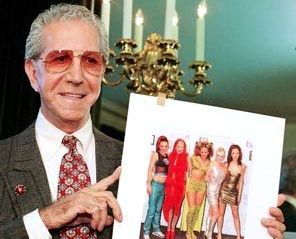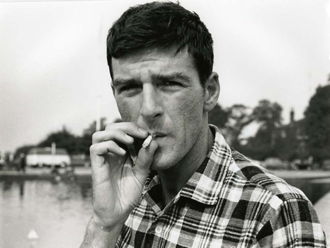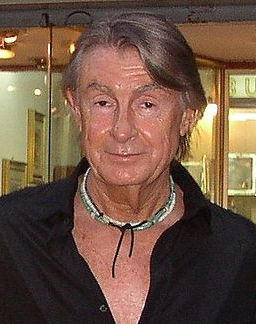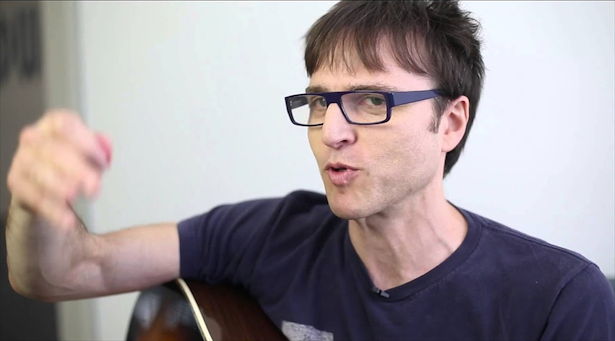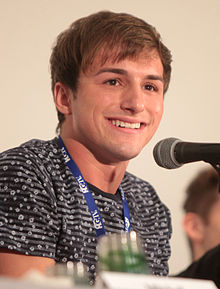|
presents THIS DAY IN GAY HISTORY based on: The White Crane Institute's 'Gay Wisdom', Gay Birthdays, Gay For Today, Famous GLBT, glbt-Gay Encylopedia, Today in Gay History, Wikipedia, and more …
Collected by Ted August 29 [{(o)}]|[{(o)}]|[{(o)}]|[{(o)}]| [{(o)}]|[{(o)}]
886 – Died: Basil I, called the Macedonian, (b.811) was a Byzantine Emperor of probable Armenian descent who reigned from 867 to 886. Born a simple peasant in the Byzantine theme of Macedonia, he rose in the Imperial court, and usurped the Imperial throne from Emperor Michael III (r. 842–867). Despite his humble origins, he showed great ability in running the affairs of state, leading to a revival of Imperial power and a renaissance of Byzantine art. He was perceived by the Byzantines as one of their greatest emperors, and the dynasty he founded, the Macedonian, ruled over what is regarded as the most glorious and prosperous era of the Byzantine Empire. Basil was born to peasant parents in the area of Adrianople in Thrace. One story asserts that he had spent a part of his childhood in captivity in Bulgaria, where his family had, allegedly, been carried off as captives of the Khan Krum (r. 803–814) in 813. Basil lived there until 836, when he and several others escaped to Byzantine-held territory in Thrace. The barest bones of Basil’s story are that he arrived in Constantinople as a penniless wanderer, and finessed friendships with a series of influential men to a point of immense political influence of his own, before assassinating his last and most powerful patron, assuming control of the empire, founding the Macedonian dynasty, and ruling over what is regarded as Byzantium's most glorious and prosperous era. A less discreet account would say that he slept his way to the top. When he arrived penniless in Constantinople, Basil was befriended by a man called Nicholas, from the church of St Diomede. Two accounts make clear that Nicholas and Basil were joined in some formal of formal rite of union, one of them using precisely the term “adelphoeisis” (the liturgical rite for church blessing of same sex unions):
On the morning after finding him, Nicholas ‘bathed and dressed Basil and was ceremonially united to him, and kept him as his housemate and companion. and, more explicitly
“on the next day he went with him to the baths and changed his clothes and going into the church established a formal union with him and they rejoiced in each other”. This was just one of two such formal unions, and other less formal unions, Basil contracted with men. What was the appeal? He was a hunk, with notable physical charms, as John Boswell points out referring to Basil’s service with his next patron, Theophilos, who
‘had a great interest in well-born. good-looking, well-built men who were very masculine and strong’.and when he saw how exceptional Basil was in these respects he appointed him his chief equerry. Basil was ‘loved by him more and more with each passing day.’ The attachment to Theophilos did not last, however. Basil soon found a more useful patron, in the form of a wealthy widow, Danelis, who “showered him with gifts of gold and dozens of slaves”. Why? She clearly had a keen eye for a coming man, and asked nothing except that he form a ceremonial union with her son John. Basil made a good show of demurring so as not to look cheap – but he could see where his interest lay. He duly entered his second same sex union, this time with John – and accepted the money and salves which came to him as a dowry. But Basil had other fish to fry, and other beds to occupy, on his climb to the throne. First was the young Emperor Michael III, who was still in his teens. Michael became so attached to Basil that he named him ‘companion of the bedchamber’, a position usually held by a eunuch….Ultimately he named Basil co-emperor. Both contemporary and modern accounts see physical attraction as influential in Micahael’s choice:
Bad as Michael’s character was,..it seems clear that we must also credit him with homosexualism (sic); and this is confirmed, both by making Basil his bedfellow, and by his choice, when when he grew tired of Basil of a pretty boy to succeed him as favourite. Basil was not content to share the empire, and in time assassinated Michael, and reigned alone. Basil I died on August 29, 886 from a fever contracted after a serious hunting accident when his belt was caught in the antlers of a deer, and he was allegedly dragged 16 miles through the woods. He was saved by an attendant who cut him loose with a knife, but he suspected the attendant of trying to assassinate him and had the man executed shortly before he himself died.
1844 – Born in Brighton, England, Edward Carpenter (d.1929), English socialist poet, socialist philosopher, anthologist, and early gay activist, was educated at Brighton College where his father was a governor. He then attended Trinity Hall, Cambridge before joining the Church of England as a curate. Carpenter left the church in 1874 and became a lecturer in astronomy. During this period, he moved to Sheffield to live in a same sex relationship with George Merrill, a working class man he had met on a train. Two men of different classes living together fairly openly as a couple was almost unheard of in England in the 1890s, a fact made all the more extraordinary by the hysteria about alternative sexualities generated by the Oscar Wilde trial of 1895 and the Criminal Law Amendment Bill passed a decade earlier "outlawing all forms of male homosexual contact," but they would remain partners for the rest of their lives. E M Forster was close friends with the couple, and he claimed that George Merrill was the inspiration for his novel Maurice. Carpenter was also a significant influence on the author D H Lawrence, whose Lady Chatterley's Lover can be seen as a heterosexualised Maurice. 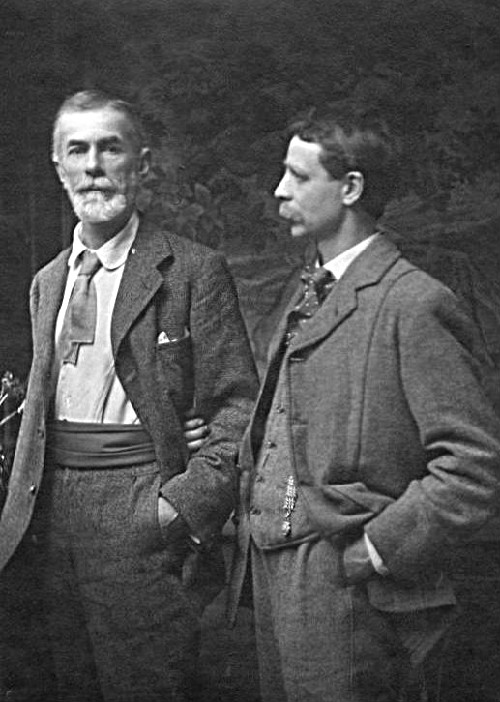 Carpenter and George Merrill Their relationship not only defied Victorian sexual mores but also the highly stratified British class system. Their partnership, in many ways, reflected Carpenter's cherished conviction that same-sex love had the power to subvert class boundaries. It was his belief that at sometime in the future, Gay people would be the cause of radical social change in the social conditions of man. Carpenter remarks in his work The Intermediate Sex: "Eros is a great leveller. Perhaps the true Democracy rests, more firmly than anywhere else, on a sentiment which easily passes the bounds of class and caste, and unites in the closest affection the most estranged ranks of society. It is noticeable how often Uranians of good position and breeding are drawn to rougher types, as of manual workers, and frequently very permanent alliances grow up in this way, which although not publicly acknowledged have a decided influence on social institutions, customs and political tendencies." (Note: The term "Uranian", referring to a passage from Plato's Symposium, was often used at the time to describe someone who would be termed "Gay" nowadays. Carpenter is counted among the Uranians himself.) In 1883, Carpenter joined the Social Democratic Federation, and in 1885 he left with William Morris to join the Socialist League. Never committing to any narrow doctrine, he dabbled in the Labour Church movement, and studied Eastern Religion, travelling to Ceylon and India in 1890. On his return he developed a kind of 'mystic socialism' which produced campaigns against air pollution and vivisection, promoted vegetarianism and 'rational dress', a reaction to Victorian clothing which included the making and wearing of sandals. These ideas were considered crackpot by many in the Left. Later he became a founder member of the Independent Labour Party in 1893. His pacifism led him to become a vocal opponent of first the Second Boer War and then the First World War. In the 1890s, Carpenter began to campaign against discrimination on the grounds of sexual orientation. He strongly believed that homosexuality was a natural orientation for people of a 'third sex'. His 1908 book on the subject, The Intermediate Sex, would become a foundational text of the LGBT movements of the 20th century. Carpenter also both supported and drew inspiration from the Women's movement. !t is his writings on the subject of homosexuality and his open espousal of this identity that makes him unique. If you are unfamiliar with Carpenter, find him - read him. He is one of the formative, foundational Gay philosophers in the late 19th and early 20th century. His influence was widespread at the time, and is no less innovative and profound, today. Harry Hay spoke many times of the influence Carpenter's work had on his early understanding of Gay sexuality. His important writings include:
After the First World War Carpenter had moved to Guildford, Surrey, with Merrill. In January 1928, Merrill died suddenly, leaving Carpenter devastated. Carpenter's state of mind is described vividly by the noted political activist G. Lowes Dickinson,
"Edward's grief when that occurred was overwhelming. I remember him walking on my arm to the cemetery at Guildford where they had buried George a few days before, and where he himself was to lie a year or so later. It was a day of pouring rain, and we stood beside the grave, while Carpenter [cried] again and again, 'They have put him away in the cold ground'." In May 1928, Carpenter suffered a paralytic stroke which rendered him almost helpless. He lived another 13 months before he died on Friday June 28, 1929. His own words form the epitaph engraved on his tombstone:
"Do not think too much of the dead husk of your friend, or mourn too much over it, but send your thoughts out towards the real soul or self which has escaped — to reach it. For so, surely you will cast a light of gladness upon his onward journey, and contribute your part towards the building of that kingdom of love which links our earth to heaven." Edward Carpenter was the first gay activist of the modern age. A true pioneer.
1867 – On this date, August 29, 1867, Karl-Heinrich Ulrichs became the first self-proclaimed homosexual to speak out publicly for homosexual rights when he pleaded at the Congress of German Jurists in Munich for a resolution urging the repeal of anti-homosexual laws. A day after his birthday no less. Imagine that scene if you can. He speaks proudly in public, knowing it will destroy his career to do so. He speaks in favor of people who still don't have a name for themselves (decades before even "homosexual" is created as a term -- along with "heterosexual" I might add). Ulrichs truly did the unthinkable.
1922 – (Richard) Mr. Blackwell, born Richard Sylvan Selzer (d.2008), in Brooklyn, New York was a fashion critic, journalist, television personality, artist, and former fashion designer known internationally as Mr Blackwell. He was the creator of the Ten Worst Dressed Women list, an annual awards presentation he unveiled in January of each year. He also published the 'Fabulous Fashion Independents' list and an annual Academy Awards fashion review, both of which received somewhat less media attention. His longtime companion, former Beverly Hills hairdresser, Robert Spencer, managed him. He wrote two books, Mr. Blackwell: 30 Years of Fashion Fiascos and an autobiography, From Rags to Bitches. After a troubled and poverty-stricken childhood he began acting in theatre in his teens. After relocating to the West Coast in the 1930s he adopted the name 'Dick Ellis' and was signed by the studios to play small parts in movies. Howard Hughes changed his name to Richard Blackwell when he signed him to RKO. He went back to Broadway in 1944 but eventually left acting for a short stint as a Hollywood agent. He discovered a talent for design while making his client's stage costumes. The name, 'Mr. Blackwell' came in the late-1950s when he launched his clothing line. He was an important designer and during the 1960s he became the first in history to present his line on a television broadcast; and the first to make his line available for plus-size women. During the nearly two decade existence of the 'House of Blackwell', he was designer to Yvonne DeCarlo, Jayne Mansfield, Dorothy Lamour, Jane Russell and California first lady Nancy Reagan. During the 1980s the emerging drift toward casual wear brought an end to The House of Blackwell. The first 'Ten Worst Dressed Women' list premiered in 1960, to moderate media success, but as the House of Blackwell became more successful, the list took off. By its third year every television and radio network and virtually all news services worldwide began to cover it. For more than forty years after first released, Blackwell annually spent a week after its publication on telephone interviews to fashion magazines, radio programmes and news networks. No star, celebrity or royal was immune to his scathing critique of their wardrobe. He on occasion included men in his lists. His lists have inspired many imitators and today's often cruel and judgemental view of celebrity fashion owes a debt to Mr Blackwell. Blackwell lived in the Hancock Park enclave of Los Angeles with his partner of 60 years, former Beverly Hills hairdresser Robert Spencer, his longtime companion and manager. In 1964, they rented their home to The Beatles for the English band's first visit to the city. It was leaked to the media, however, and the group made other arrangements In 2001, Blackwell was diagnosed with Bell's Palsy which causes limited to severe paralysis of facial muscles and effects the use of the extremities and can effect eyesight as well. Although it is treatable it is incurable, however often it tends to clear up on it own. He was unable to unveil the 2000 list at a live news conference for the first time in its 40-year history and remained out of the public eye for six months. He came back for the 2001 Worst Dressed and continued his great work, awarding 2006's No 1 spot jointly to Britney Spears and Paris Hilton. Blackwell died in Los Angeles in October 2008 of complications from an intestinal infection. He was 86.

1928 – Charles Gray (d.2000) was an English actor who was well known for roles including the arch-villain Blofeld in the James Bond film Diamonds Are Forever, Dikko Henderson in a previous Bond film You Only Live Twice, Sherlock Holmes's brother Mycroft Holmes in The Adventures of Sherlock Holmes and as the Criminologist in the cult classic The Rocky Horror Picture Show in 1975. Gray attended Bournemouth School alongside Benny Hill, whose school had been evacuated to the same buildings, during the Second World War. Some of his friends remember that his bedroom walls were plastered with pictures of film stars. Charles Gray distinguished himself in theatrical roles, in the Regent's Park Open Air Theatre, London, at the Royal Shakespeare Company, Stratford-Upon-Avon, and at the Old Vic. He received his vocal training at the RSC and became noted for his imposing stage presence; features which would translate impressively to character parts on screen. During the 1960s, Gray established himself as a successful character actor and made many appearances on British television. Work in this period included Danger Man with Patrick MacGoohan and Maigret. Gray also appeared opposite Laurence Olivier in the film version of The Entertainer (1960) as a reporter. In 1964 he played murderer Jack Baker in the Perry Mason episode, "The Case of the Bullied Bowler." His breakthrough year came in 1967 when he starred with Peter O'Toole and Omar Sharif in the WWII murder-mystery film The Night of the Generals. The following year he played Henderson, an Australian intelligence officer assigned to the Australian Embassy in Tokyo, in the 1967 Bond film You Only Live Twice. Four years later he appeared as Ernst Stavro Blofeld in the James Bond movie Diamonds Are Forever, both films starring Sean Connery as Bond. These make Gray one of the small number of actors to have played a villain and a Bond ally in the film series, another being Joe Don Baker. Gray's most prolific work as an actor was between 1968 and 1979 when he appeared in more than forty major film and television productions. In this period he is perhaps best known for portraying the Criminologist (the narrator) in The Rocky Horror Picture Show, and a similar character, Judge Oliver Wright, in its 1981 sequel Shock Treatment.He regularly dubbed for Jack Hawkins after Hawkins's larynx was removed to combat throat cancer, as the two otherwise highly distinctive men's voices were similar. An example of this is in the film Theatre of Blood.
1929 – Thom Gunn born in Gravesend, Kent (d.2004), was an Anglo-American poet who was praised both for his early verses in England, where he was associated with The Movement and his later poetry in America, even after moving toward a looser, free-verse style.. In his youth, he attended University College School in Hampstead, London. Later, he read English literature at Trinity College, Cambridge, graduated in 1953, and published his first collection of verse, Fighting Terms, the following year. In 1954, he emigrated to the United States to teach writing at Stanford University and to remain close to his partner, Mike Kitay, whom he had met while at college. After relocating from England to San Francisco, Gunn, who became openly gay, wrote about gay-related topics — particularly in his most famous work, The Man With Night Sweats in 1992 — as well as drug use, sex, and topics related to his bohemian lifestyle. He won numerous major literary awards.During the 1960s and 1970s, his verse explored society's increasingly liberal views of drugs, homosexuality, and poetic form. The poet's major stylistic change in his shift toward free verse roughly within a decade that included much of the 1960s, combined with the other changes in his life — his move from England to America, from academic Cambridge to bohemian San Francisco, his becoming openly gay, his drug-taking, his writing about the "urban underbelly" — caused many to conjecture how his lifestyle was affecting his work "British reviewers who opposed Gunn's technical shifts blamed California, just as American critics would, later on, connect his adventurous lifestyle with his more 'relaxed' versification," according to Orr, who added that even as of 2009, critics were contrasting "Gunn's libido with his tight metrics — as if no one had ever written quatrains about having sex before" His most famous collection, The Man With Night Sweats (1992), is dominated by AIDS-related elegies. Neil Powell praised the book: "Gunn restores poetry to a centrality it has often seemed close to losing, by dealing in the context of a specific human catastrophe with the great themes of life and death, coherently, intelligently, memorably. One could hardly ask for more." As a result of the book, Gunn received the Lenore Marshall Poetry Prize in 1993. Although AIDS was a focus of much of his later work, he remained HIV-negative himself. In 2004, he died of acute polysubstance abuse, including methamphetamine, at his home in the Haight Ashbury neighborhood in San Francisco, where he had lived since 1960.
1939 – Joel Schumacher is an American film director, screenwriter, and producer. Schumacher has been openly gay throughout most of his career. According to Schumacher, this fact has been purposely reflected as a statement in many of his films. He began his media work as a costume designer in films such as Sleeper and developed his skills with television work. He wrote the screenplay for the 1976 low-budget hit movie Car Wash and a number of other minor successes. He also wrote 1978's The Wiz, an adaptation of the stage play of the same name. His film directorial debut was The Incredible Shrinking Woman in 1981, which starred Lily Tomlin, and he quickly made more successful films, including two "brat pack" works. St. Elmo's Fire and The Lost Boys, considered to be archetypal movies of the 1980s, were two of Schumacher's biggest hits. Schumacher later replaced Tim Burton as the director of the Batman film franchise due to the reaction by parental groups to Batman Returns (1992). He directed Batman Forever (1995), replacing Michael Keaton with Val Kilmer; the film would go on to score the highest-grossing opening weekend of 1995, and would finish as the second highest-grossing film of the year. Inspired by this success, Warner Bros hired Schumacher to direct a sequel, Batman & Robin, in 1997. But after scathing reviews and a drop in ticket sales from the first film, Warner Bros put the series of movies on hiatus, canceling Schumacher's next planned Batman movie Batman Triumphant. Schumacher directed a film version of the musical The Phantom of the Opera in 2004, an adaptation of Andrew Lloyd Webber's original stage musical. Despite mixed reviews, the film earned $154.6 million worldwide (Schumacher's biggest hit of the 21st Century to date) and was nominated for three Academy Awards, as well as three Golden Globes including Best Motion Picture-Musical or Comedy. Schumacher has been openly gay through most of his career. In Liz Smith's memoir, Natural Blonde, she states that "He called himself 'A Sexual Outlaw'". Batman Forever, and to an even greater degree its 1997 sequel Batman & Robin, generated controversy for what fans considered to be homo-erotic innuendos.
1956 – Mark Morris is an American dancer, choreographer and director whose work is acclaimed for its craftsmanship, ingenuity, humor, and at times eclectic musical accompaniments. Morris is popular among dance aficionados, the music world, as well as mainstream audiences. Morris grew up in Seattle, Washington, in a family that appreciated music and dance and nurtured his budding talents; his father Joe taught him how to read music and his mother Maxine introduced him to flamenco and ballet. He studied as a young boy with Verla Flowers and Perry Brunson. At the age of 16, after graduating early from high school, he traveled to Spain where, at the time, he felt he was destined to be a Flamenco dancer. Because of the Franco regime, among other things, he returned to the United States and by 19 moved to New York City and lived in a loft in Hoboken, New Jersey, with other artists (Robert Bordo and Donald Mouton among others) who also worked or performed in the city. In the early years of his career, he performed with the companies of Hannah Kahn, Laura Dean, and Eliot Feld. On November 28, 1980, he got together a group of his friends and put on a concert of his own choreography and called them the Mark Morris Dance Group. For the first several years, the company gave just two annual performances – at On the Boards in Seattle, Washington, and at Dance Theater Workshop in New York. In 1984 he was invited to The American Dance Festival as part of the young choreographers and composers program. In 1986, the company was featured on the nationally televised Great Performances – Dance in America series on PBS. In 1988, he was approached by Gerard Mortier, then the head of the Théâtre Royal de la Monnaie in Brussels. Mortier needed a replacement when Maurice Béjart, who had held the position of Director of Dance for over 20 years, suddenly left and took his company with him. After seeing the Mark Morris Dance Group give one performance, Mortier offered Morris the position. His company, from 1988 to 1991, became the Monnaie Dance Group Mark Morris, the resident company at la Monnaie where Morris was given well-equipped offices and studios; full health insurance for him, his staff and dancers; an orchestra and chorus at his disposal; and one of the great stages of Europe on which to dance. In 1990, Morris and Mikhail Baryshnikov established the White Oak Dance Project. He continued to create works for this company until 1995. Though now largely retired from performing, Morris was long noted for the musicality and power of his dancing as well as his amazing delicacy of movement. His body was heavier than the typical dancer, more like that of an average person, yet his technical and expressive abilities outstripped those of most of his contemporaries. Morris lives in the Kips Bay neighborhood of Manhattan. He is openly gay.
1966 – Stephen Trask, (né Schwartz) is an American musician and composer who graduated from Wesleyan University. He was the music director and house band member at the New York City club Squeezebox, where they performed with stars such as Debbie Harry, Lene Lovich and Joey Ramone. Trask composed the music and lyrics for the stage musical Hedwig and the Angry Inch (also a 2001 film), about a struggling rock star named Hedwig. Trask's real-life band Cheater performed as Hedwig's band "The Angry Inch". He received an Obie Award for the play and a Grammy Award nomination for the movie. Trask resides in Lexington, Kentucky, with his husband Michael Trask, who is a professor at the University of Kentucky. They were married by their neighbor, former state senator Kathy Stein.
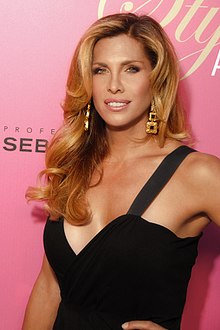
1971 – Candis Cayne is an American actress and performance artist. Cayne was known to perform in New York City nightclubs in drag since the 1990s, and started her transition as a trans woman in 1996; Cayne came to national attention in 2007 for portraying transgender mistress Carmelita on ABC's prime time drama Dirty Sexy Money. The role makes Cayne the first transgender actress to play a recurring transgender character in primetime. Candis Cayne was born Brendan McDaniel in 1971 on Maui, Hawaii. She has a fraternal twin brother named Dylan. Their parents taught at a Waldorf School, and the family lived on campus. She graduated from Maui's Baldwin High School in 1989[2] and then spent a year in Los Angeles, where she trained as a dancer. Cayne then moved to New York in the early 1990s, making a name for herself as a choreographer and drag performer. Unaware of what a transsexual was until she lived in New York, about three years after her arrival Cayne realized that the term described how she felt about herself. Already performing as "Candis Cayne" at New York gay bar Boy Bar and as a featured performer at Tour in New York's Chelsea, the entertainer also participated in Wigstock, the annual drag festival in Manhattan's East Village. In 1995 Cayne appeared in the related documentary film Wigstock: The Movie, the comedy-drama film Stonewall, and the Universal Studios comedy feature film To Wong Foo, Thanks for Everything! Julie Newmar, for which she also did choreography. Cayne began transitioning circa 1996. Cayne has stated, "I'm not trying to be a spokeswoman for the transgender community; I just want to be looked at as a living, breathing, happy human being." She calls the LGBT community "the last great minority" and supports the Gay & Lesbian Alliance Against Defamation. In August 2015 Candis Cayne teamed up with the global LGBT social network MOOVZ as the new global creative director. For over eight years, ending in 2010, Cayne was in a relationship with DJ Marco McDermott, to whom she referred as her husband. During that time, she helped raise McDermott's daughter, Satori, from a previous relationship. In 2016, during season 2 of the reality show I Am Cait, Cayne explored the possibility of adopting as a single parent.
1977 – Thomas Ays, born in Säckingen, now Bad Säckingen, Germany, is a German author, of gay fiction. Thomas Ays writes novels for gay adolescents and adults, but they are also strongly aimed at heterosexuals sensitize them about certain problems of being gay. In his debut novel Romeo and Julian, for example, he not only addresses the problems of coming out, but also primarily deals with the relationship between parents and their homosexual children. His first novel Romeo and Julian was published in 2010 by Himmelstürmer Verlag in Hamburg , a publishing house for gay literature. In September 2011, the second novel followed, The inner scream , which deals with homosexuality only marginally and at its core deals with depression. In addition to his work as a freelance writer, Thomas Ays was also the owner and editor-in-chief of the web-based film critic database moviesection.de. The portal existed from 2001 to 2016 and contained over 6,000 film reviews. From 2002 to July 2020 he also headed the sister site booksection.de. More than 3,000 short book reviews have been published in the privately managed database. At the same time he has been the head of the Tourism and Culture Office of the city of Bad Säckingen since January 2019.
1993 – Lucas Cruikshank is an American actor and YouTube personality. Living in Columbus, Nebraska, he created the character Fred Figglehorn and the associated Fred series for his channel on the video-sharing website, YouTube. These videos are centered on Fred Figglehorn, a fictional 6-year-old who has a dysfunctional home life and "anger management issues". Cruikshank, while testing character ideas, created the Fred character in a Halloween video, and uploaded it to a YouTube channel that he had started with his two cousins. Upon the success of Fred, he started a video series, and set up the Fred channel in April 2008. By April 2009, the channel had over one million subscribers, making it the first YouTube channel to do so, and the most subscribed channel at the time. In December 2009, Cruikshank filmed Fred: The Movie, which aired on Nickelodeon in September 2010. Nickelodeon created a franchise surrounding the character, and began producing the sequel in March 2011. Fred 2: Night of the Living Fred aired on October 22, 2011, also on Nickelodeon. In 2012 Fred: The Show aired, consisting of 20 11-minute episodes, as well as a third movie. Lucas Cruikshank was born on and raised in Columbus, Nebraska. Cruikshank is openly gay. In a video released August 20, 2013, he came out saying "I'm gay. I feel so weird saying it on camera. But my family and friends have known for like three years. I just haven't felt the need to announce it on the Internet."
|


